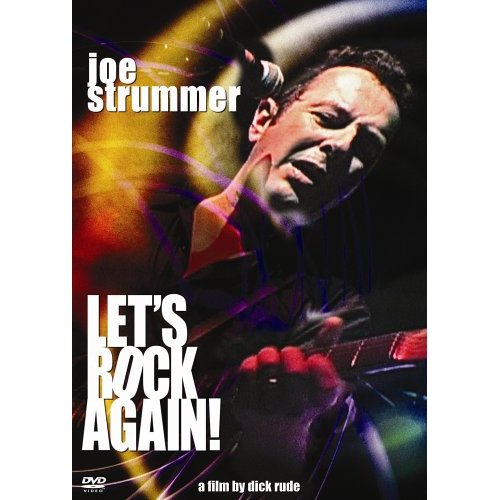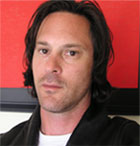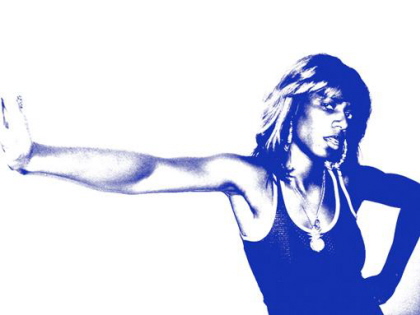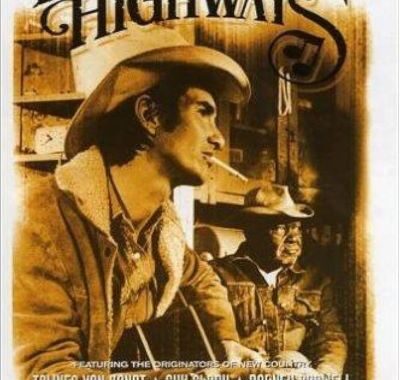
Required Viewing: Let’s Rock Again / Q&A with Dick Rude
If you’ve been hanging around here a while, you know I’m a huge admirer of Joe Strummer. I never knew Joe, but through his music, video footage, and the occasional anecdote in interviews and articles, you get a good idea of what the man was all about: compassion for humanity (especially compassion for the underdog), a genuine and fierce inclination to question those in power (for good reason), and the craftsman of some of the most groundbreaking and eclectic music out there. What hasn’t been written about the impact of the Clash? They were one of the pioneers of punk; and by London Calling and Sandinista!, they really started to stretch out and show their true colors – their appreciation for all kinds of music: reggae, blues, soul, even early hip-hop.
After a long hiatus from making music, Joe returned in the late 90’s with a new band: the Mescaleros, which truly was a showcase of Joe’s passion for the music of the world. In what would tragically be his last years, Joe released two albums and toured the world with the Mescaleros (one album, Streetcore, was released posthumously). Thankfully, Joe’s good friend, filmmaker Dick Rude, was along for the ride over the last 18 months of Joe’s life – documenting life on the road with Joe and the Mescaleros.
The result was a terrific film called Let’s Rock Again. After the film was screened at the 2007 Tribeca Film Festival, Let’s Rock Again was released earlier this year. The film documents Joe’s tour supporting 2001’s Global a Go Go album. We see Joe and band trucking through the U.S. and Japan. In between the amazing live stage footage, we get a rare glimpse into the do-it-yourself rock n’ roll lifestyle: in-store appearances, interviews with the media, photo shoots, and down time spent chatting it up with some fans.
There are two of these moments that really stand out. The first is watching Joe Strummer, rock n roll hero, hand out show fliers on the Atlantic City boardwalk. If you’re a fan of Joe’s like I am, it’ll drive you crazy watching people ignore – and even go out of their way to avoid – the great Joe Strummer. But like Rude says in the Q&A below, you can’t expect everyone to know who Joe is. It was just my primal reaction as a huge fan of Joe’s.
The other is when Joe goes to an Atlantic City rock station unsolicited. He’s on the intercom outside the station trying to convince them to play a track off his new album and plug the upcoming show. He’s finally allowed entry when he tells them he used to be in a rock band called the Clash.What most affected me about the film, though, is the intimate portrait of Joe Strummer the man. As a good friend of Rude’s, Joe has a comfort level in front of the camera that lets us, the viewers, peer into his soul. The fact that he would be gone a few short months after the footage was shot makes it even more special and bittersweet.
The feature clocks in at just over an hour. But don’t overlook the bonus features. They include several interview clips of Joe discussing politics, touring, songwriting, and life in general. It is such a treat to get to know the man better.The bonus section also includes several live tunes that did not make it into the film, among them: “Armagideon Time”, “The Harder They Fall”, and “Rudie Can’t Fail”.
One of the things I enjoyed most about the bonus features was a 15-minute Q&A session with Dick Rude at the Tribeca Film Festival. It inspired me to reach out to him with some additional questions, and he was kind enough to respond…
Ickmusic’s Q&A With Dick Rude

Dick’s Bio (from his web site):
Dick Rude was born and raised in Los Angeles. His film career began at the age of 15 when he attended the Lee Strasberg Theatre Institute. As an actor he has appeared in several films including “Sid and Nancy”, “The Wild Life” and “Repo Man,” which he also participated in as a contributing writer. Rude left UCLA Film School to co-write and star in “Straight to Hell,” which features such notables as Dennis Hopper, Courtney Love and Elvis Costello.His other writing credits include a pilot for Sophia Coppola, “Hi Octane” and an un-produced script commissioned by River Phoenix. As a Producer/Director, Rude has done several music videos. His latest accomplishments have been music documentaries for Blonde Redhead: “Nothing Something,” Red Hot Chili Peppers’ “Off the Map” and “LA Punk – The First Five Years,” featured on the “Punk Attitude” DVD.
Pete: How did the idea for the project come about? Was it something you and Joe had talked about over the years?
D.R.: I had some free time in between gigs and I called Joe. I said it would be great to hang out and maybe I should come to England and we could make a documentary. He said that he was just sitting around the campfire and that it might be a bit boring. Several months later, he rang me up and said The Mescaleros were going on tour and wanted to know if I wanted to come along and be a part of it. Our whole intention had always been to get the word out on the new music.
Pete: You shot all the way up to the months preceding Joe’s death (the Japan footage). Were you done shooting when Joe passed on, or were you planning on getting more footage?
D.R.: I had completed shooting a year earlier. Joe was excited about the Japan tour and insisted that I come out for that. I’m happy I did, because some of the best footage came from that tour. On a personal level, I am grateful I got to spend that extra time with him.
Pete: Was Joe involved in the project all the way up to his death? Or, what was to be Joe’s overall involvement?
D.R.: Joe was a huge promoter of my art and never wanted any hands on involvement. Some of the financing and tour support came directly from him. I had mixed all the live tracks before we met in Japan and I brought the cds for him to listen to. His response was, “Dick, I trust your judgment, just make your movie”. I practically cried. I have never had such love, faith and support from any artist I’ve worked with before. Imagine trusting someone else with the way your music sounds. He truly believed in me.
Pete: Growing up in L.A., what came first for you personally, an appreciation for L.A. punk or British punk?
D.R.: Punk rock was simultaneous for me from all geography. I knew of The Sex Pistols and The Clash, The Damned and a few others. I would go the shows when they all came to town. I was equally turned on by the New York scene. My roots were in Los Angeles. I was tape recording Rodney Bingenheimer’s show every week and hanging out at The Starwood. It was a very formative period for me and I was hungry for all I could get.
Pete: I discovered the Clash through my older brother. I was 11 years old, playing a tennis racket into the mirror, singing “Death or Glory”. How did the Clash first enter into your consciousness?
D.R.: I must have heard them on the radio. I remember going to see them early on at the Santa Monica Civic. When I was up front, Joe was spitting on me the whole time due to his singing style. I moved towards the back and later caught Topper’s drumstick at the end of the show.
Pete: You saw Joe & the Mescaleros a bunch of times. Were you lucky enough to catch the Clash live? Did you ever see Joe play with the Pogues in the early 90’s?
D.R.: I went with Joe to the Pogues show in Los Angeles when he was singing for them. I think he dedicated a song to me. It was a great to see him performing with them. He really loved those guys and their music.
Pete: You met Joe during the post-production of ‘Sid & Nancy’. It led to working with Joe on films like ‘Walker’ and ‘Straight to Hell’. You guys must have hit it off. How did your relationship with Joe develop?
D.R.: I think Joe and I were kindred souls. We had a very natural rapport with each other. From all the letters and stories I have heard over the years, I guess everyone felt this way about him. Somehow we had a connection that never died. It’s hard to explain why or how you become best friends with someone.
Pete: Were you as mystified as I was while shooting the scenes of Joe on the Atlantic City boardwalk, handing out fliers to his show that night? As people ignored and avoided the great Joe Strummer, how did you resist the urge to put down the camera and give these people the good slap they deserved?
D.R.: I didn’t feel that way at all. Joe and I were having fun. There was nothing serious about what we were doing. You can’t expect everyone in the world to be your fan and it wasn’t exactly like we were in a Rock and Roll environment. Ghandi could have been there doing the same thing and gotten the same lack of attention. As a Strummer fan, it would be a gift to have that opportunity, but there are billions of people in the world and not all of them have pictures of Joe on their walls or really even give a fuck. He meant a lot to a lot of people. He was a hero on many levels, but he refused to be bowed down to. How can we be angry at people for not knowing about someone or something. Now if they would have been saying you suck, that might have been a different story.
Pete: You mentioned in the Q&A part of the DVD that Joe seemed invigorated, almost like a kid, during the last leg of the Mescaleros tour in Japan – only a couple months before his death. Can you share more about how these last shows seemed different to you? Do you think it was a matter of him getting his self-confident stage persona back, and hitting his stride once again?
D.R.: The music towards the end was really coming back to the rock roots in my opinion. Joe’s security in what he was doing and his lust to perform were clearly evident in the way he was abandoning himself to the music and audience. As you see in the film, he was rolling on the floor and giving it his all. I don’t think his confidence really ever waned that much but I do believe he was loving the experience in a way that a teenager would.
Pete: You and Joe had a show on MTV2 called Global Boombox. I share your and Joe’s passion for keeping an open mind about music, and seeking out the “weird” stuff, like he says in your film. Did Joe introduce you to a lot of new music? Vice versa? You mentioned Manu Dibango. What else?
D.R.: It seemed like one of Joe’s purposes in life was to turn people on to music, whether it was his own or someone else’s. I certainly was a recipient of his eclectic tastes. He didn’t seem to know too much about LA Punk and I think I was able to turn him onto some of that. He liked the Minutemen, who for me were one of the most influential bands of my life.
Pete: What are you working on these days? What should we be on the lookout for? I see you’re currently working on a new project with your friend Jim Jarmusch?
D.R.: I’ve got a film called The Asshole, which I’ll be shooting next year. It’s a piece I wrote awhile back with Alex Cox. It is Repo Man times one hundred but quite a bit more accessible. Also gonna be shooting another film before the end of this year called Quit, which I am equally excited about. It is the story of a couple who go away to the desert together to quit smoking, which becomes a metaphor for their relationship.
——————–
LINKS:
- Buy Let’s Rock Again
- The Let’s Rock Again MySpace page
- Dick Rude’s Official Web Site
- Check out some video clips of MTV2’s Global Boombox, hosted by Dick Rude and Joe Strummer.
The trailer for Let’s Rock Again:
Here’s Joe Strummer’s last music video, “Coma Girl”, directed by Dick Rude:



5 Comments
Jeffro
For a second there, I thought you had put “Rick Rude,” as in Ravishing Rick Rude, the deceased WWF wrestler!
Michael
Awesome Pete, I’ll have to get this…
Brian
Pete, that is just an awesome post. What’s weird is that as I’ve been listening to a Clash boot tonight, and damned if I didn’t come here and find a Joe post. Freakey-deakey.
As for Joe’s untimely death, I think I share the same”How could this have happened” feeling. I remember hearing about when I was in Venice, and feeling very small and helpless, and then feeling selfish because my first reaction was that I had somehow been cheated. Like Streetcore was a tease, a promise of things to come that was snatched away from me, the same way I felt when John Lennon died. Not fucking fair!
Joe Ammoscato
Man I was just telling my buddy last week that I have to get this DVD on the Great Joe Strummer. And here you are posting a great review and interview. I am currently reading The Joe Strummer book, Redemption Song: The Ballad of Joe Strummer, a great read. And lastly I can’t wait until the DVD of The Future is Unwritten comes out, it’s not playing in my neck of the woods. So Pete thanks for posting anything about Joe Strummer the more I learn about him the more I here his music the more angry I get that nothing new will come from him. Thanks again…..
Pete
Guys – thanks… it’s great to hear feedback from people who are as affected by Joe Strummer as I am. We should all throw 100% support into projects like this that keep his legacy alive & thrashing….